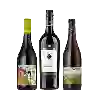
Winery Mas de Daumas GassacCuvée Émile Peynaud
In the mouth this red wine is a powerful with a nice balance between acidity and tannins.
This wine generally goes well with beef, veal or pasta.
Taste structure of the Cuvée Émile Peynaud from the Winery Mas de Daumas Gassac
Light | Bold | |
Smooth | Tannic | |
Dry | Sweet | |
Soft | Acidic |
In the mouth the Cuvée Émile Peynaud of Winery Mas de Daumas Gassac in the region of Pays d'Oc is a powerful with a nice balance between acidity and tannins.
Wine flavors and olphactive analysis
On the nose the Cuvée Émile Peynaud of Winery Mas de Daumas Gassac in the region of Pays d'Oc often reveals types of flavors of oaky, leather or black currant and sometimes also flavors of earth, oak or black fruit.
Food and wine pairings with Cuvée Émile Peynaud
Pairings that work perfectly with Cuvée Émile Peynaud
Original food and wine pairings with Cuvée Émile Peynaud
The Cuvée Émile Peynaud of Winery Mas de Daumas Gassac matches generally quite well with dishes of beef, pasta or veal such as recipes of puchero, fideuà (paella with pasta and fish) or stuffed red mullet ballotines.
Details and technical informations about Winery Mas de Daumas Gassac's Cuvée Émile Peynaud.
Discover the grape variety: Cabernet-Sauvignon
Cabernet-Sauvignon noir is a grape variety that originated in France (Bordeaux). It produces a variety of grape specially used for wine making. It is rare to find this grape to eat on our tables. This variety of grape is characterized by small bunches, and small grapes. Cabernet-Sauvignon noir can be found in many vineyards: South-West, Loire Valley, Languedoc & Roussillon, Cognac, Bordeaux, Armagnac, Rhone Valley, Provence & Corsica, Savoie & Bugey, Beaujolais.
Last vintages of this wine
The best vintages of Cuvée Émile Peynaud from Winery Mas de Daumas Gassac are 2015, 2008, 2001, 2007
Informations about the Winery Mas de Daumas Gassac
The Winery Mas de Daumas Gassac is one of of the world's greatest estates. It offers 67 wines for sale in the of Hérault to come and discover on site or to buy online.
The wine region of Hérault
The wine region of Hérault is located in the region of Pays d'Oc of Vin de Pays of France. Wineries and vineyards like the Domaine La Grange des Pères or the Domaine La Grange des Pères produce mainly wines red, white and pink. The most planted grape varieties in the region of Hérault are Merlot, Cabernet-Sauvignon and Chardonnay, they are then used in wines in blends or as a single variety. On the nose of Hérault often reveals types of flavors of minerality, yellow apple or passion fruit and sometimes also flavors of nutty, anise or stone fruit.
The wine region of Pays d'Oc
Pays d'Oc is the PGI for red, white and rosé wines that are produced over a wide area of the southern coast of France. The PGI catchment area corresponds roughly to the Languedoc-roussillon">Languedoc-Roussillon wine region, one of the largest wine regions in France. The area covers all wines that are not produced under the strict laws that govern AOC-level appellations in the regions: among them, Corbières, Minervois and the Languedoc appellation itself. The Pays d'Oc PGI is arguably the most important in France, producing the majority of the country's PGI wines.
The word of the wine: Beurré
Typical aroma of white wines aged in oak barrels and wines that have undergone malolactic fermentation.













